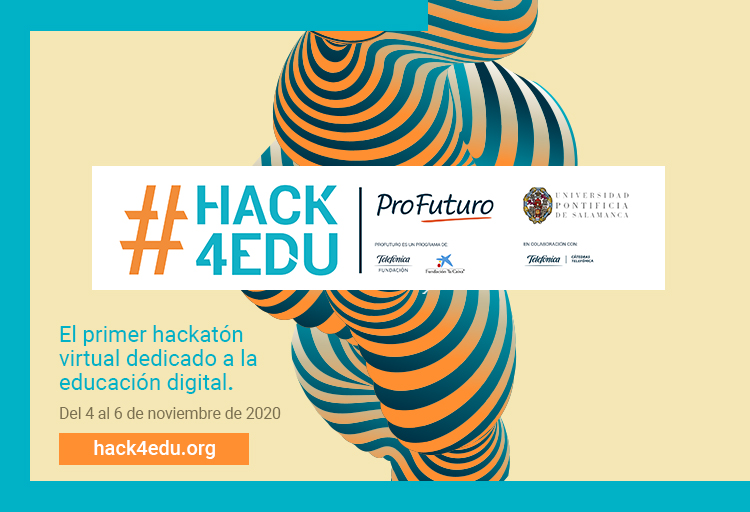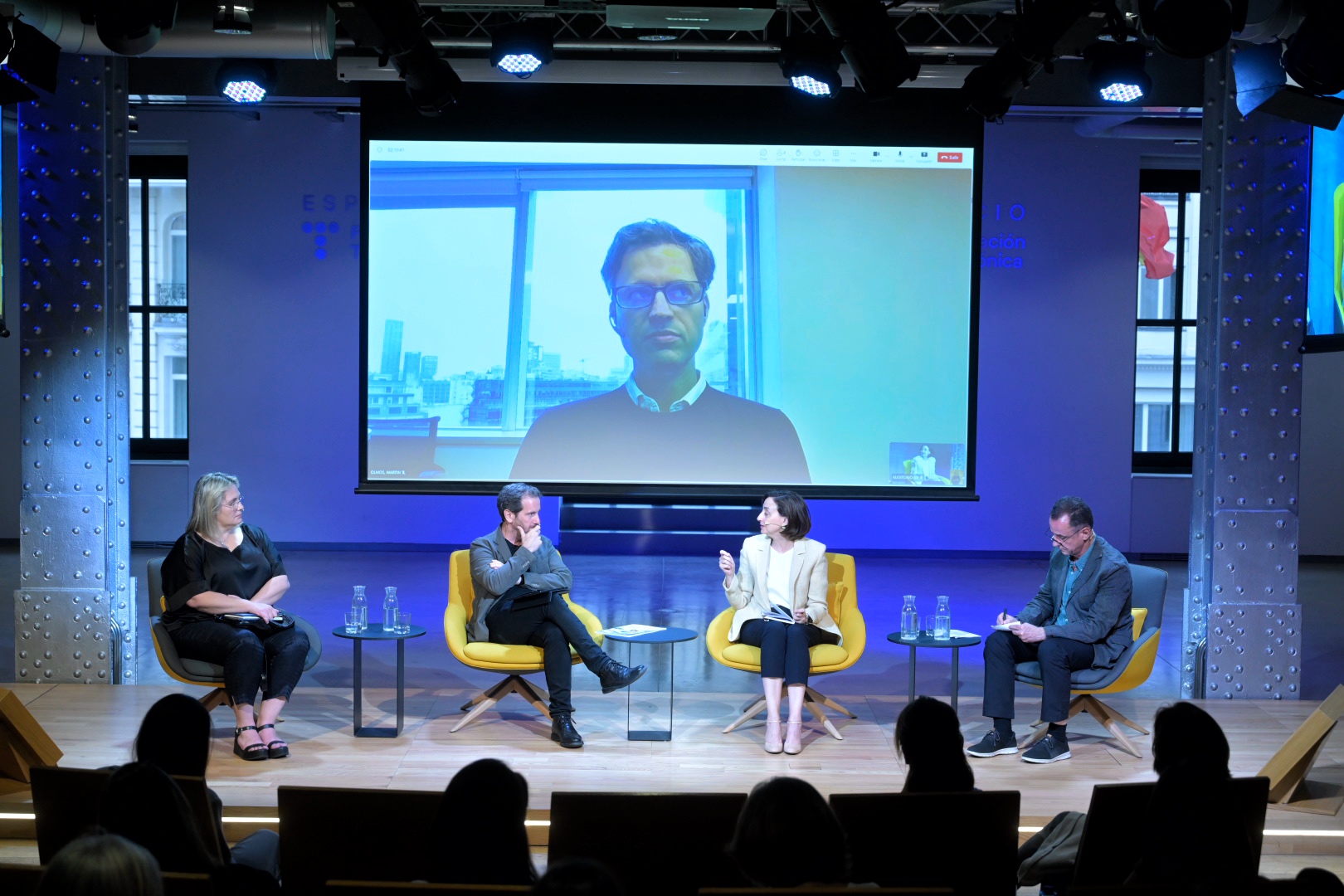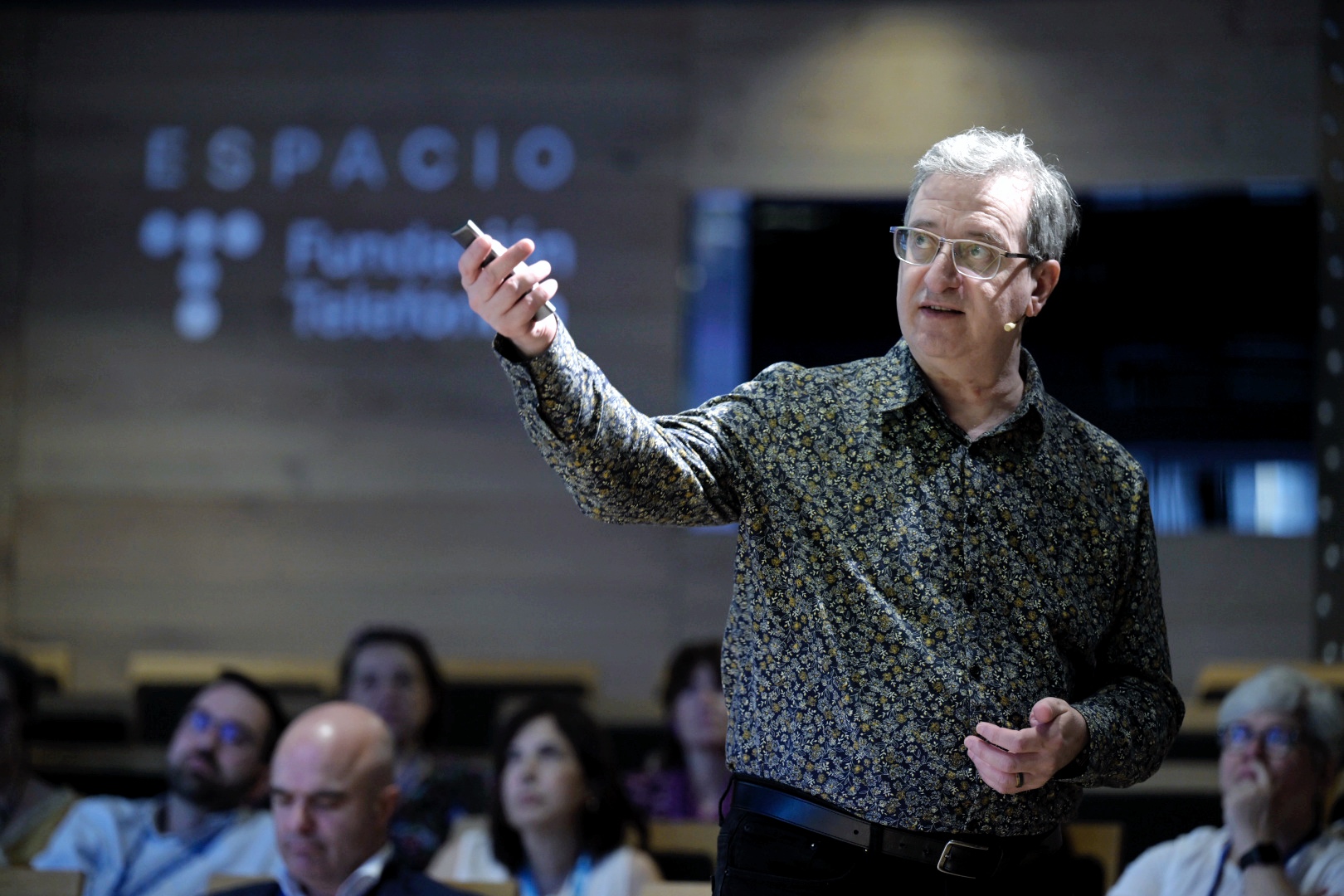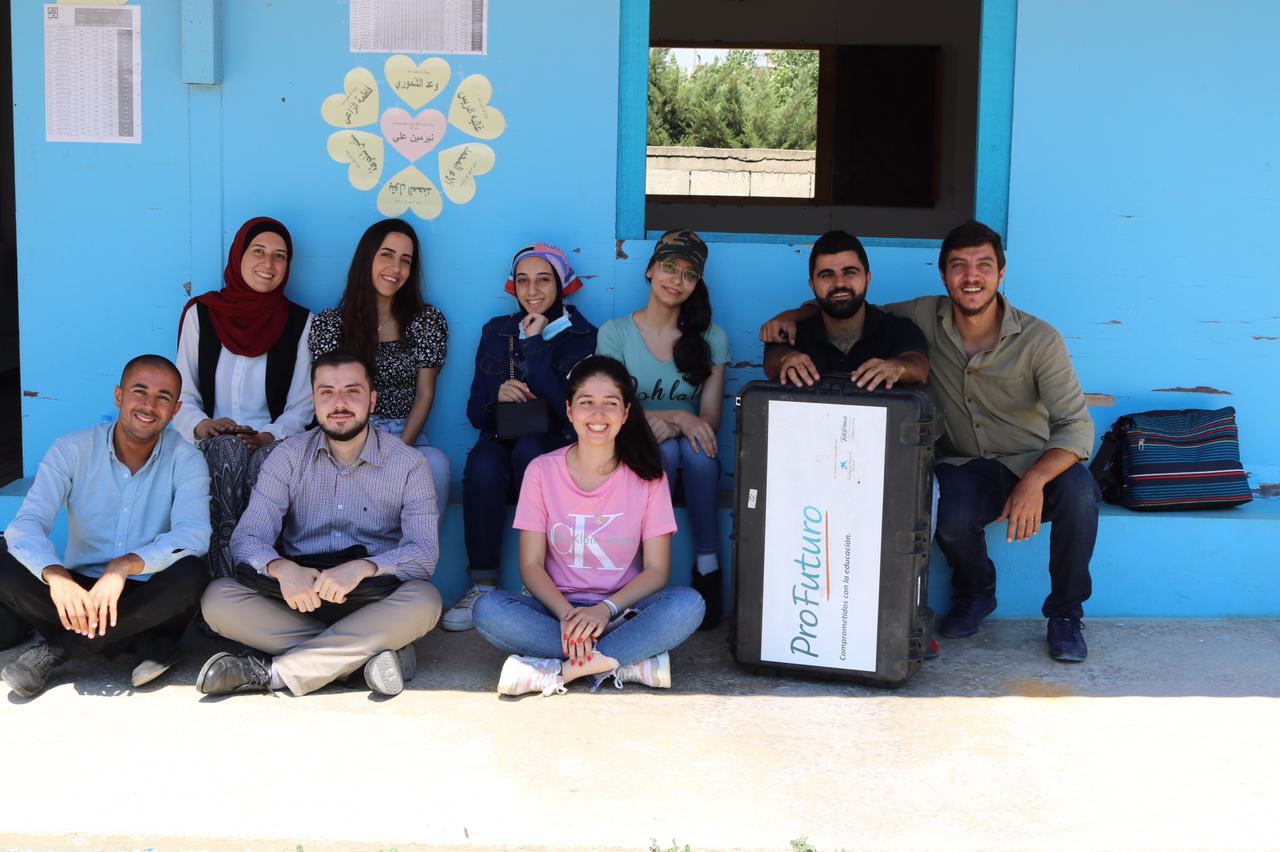The virtual hackathon, organised by ProFuturo and Universidad Pontificia de Salamanca (UPSA) through the Telefónica Chairs network, was inaugurated in the afternoon of 3 November in a virtual ceremony, and it will last until Friday the 6th. A total of 10 Spanish and Latin American universities have joined #hack4edu and are participating actively in both posing challenges and forming the teams, as well as developing the hackathon locally.
“In these times of such uncertainty for the education sector, inaugurating an initiative like this one, which places the creativity of universities at the service of educational innovation, fills me with satisfaction and hope”, stated Magdalena Brier, Managing Director of ProFuturo, when inaugurating the event. “We are seeing how schools are fighting to open up and remain open and how teachers are giving it their all so that their students can continue receiving an education and so that the virus does not clip the wings of their professional aspirations. During these three days, 150 hackers will join this huge effort and will search for solutions to the challenges faced by digital education today”, she said, while at the same time thanking the participants for their contribution and talent.
Digital education allowed many students to finish the school year from home, and in some places today, it is enabling the combination of on-site presence and remote education to ensure a safe environment at schools. However, the Managing Director of ProFuturo recalled how the sudden closure of schools and universities shows that “we are not entirely prepared for this jump to the virtual world. There are many challenges pending, especially in the most vulnerable environments”.
“Digital education must not be ‘a luxury’, rather a necessary and useful tool that contributes to improving educational quality for everyone. We cannot allow the digital gap to exacerbate the already existing education gap. Therefore, our hackers are already thinking about tools that allow accessing digital education content in areas with limited connectivity”, the head of ProFuturo pointed out, for whom “digitisation of the education sector must be inclusive”. Therefore, during the three days of the event solutions will also be sought for the obstacles that are faced by blind persons when using touch devices or for the effects that web pages and applications with many colours and movements could have on people with autism.
“The possibilities of technology are infinite; let’s let them serve education. In fact, that’s what we are doing today. Technology is precisely what allows us to hold this hackathon remotely, in which people in 6 different countries, separated by an ocean, can work as a team and can merge their talents through a digital platform. This initiative is itself an example of educational innovation, given that it allows university students to learn while designing solutions to real problems, a true exercise of learning and service”, she concluded.
Different challenges for different problems
During these three days, multidisciplinary groups of hackers from Spain, Argentina, Colombia, Nicaragua, Peru and Uruguay will work remotely on designing a prototype that resolves some of the 45 challenges that have been posed for #hack4edu since 29 July. Highlights include those related to access to digital educational content in areas with limited connectivity, controlling the influx of students at schools and overcoming the limitations of remote education in imminently practical subjects such as science. The challenges faced by people with autism or by the blind when using touch technology devices and certain web pages or applications with many colours and movement were also put on the table.
In turn, ProFuturo proposes that participants develop a tool that, using data analytics, is capable of recommending specific content to teachers according to the training courses that each one completes on our ProFuturo online platform.
The hackers will form teams around the challenges that they are interested in tackling. Two mentors and technical volunteers will be assigned to each team and will support and advise them over the three days. The hackathon, which will be 100% online, will take place through the digital work tool on Slack equipment.
Once the prototype development time has ended, the teams will present their projects locally on 6 November in a virtual ceremony. A jury integrated by specialists on technology and education will evaluate them based on several criteria, including the creativity of the proposal and the possibility of using the prototype in the real market. The three winning projects of each local headquarter will compete internationally. The global winners will be announced on 7 November in a virtual prize award ceremony.
The three best projects will be awarded with prizes of 2,000, 1,000 and 500 euros. Moreover, the network of Telefónica Chairs will offer three free enrolments in the expert masters programme in Big Data at the Universidad Pontificia de Salamanca, and ProFuturo will award a specific prize of 1,000 euros to the project that best responds to the challenge posed by the programme of the Telefónica Foundation and the “la Caixa” Foundation.
Projects with the greatest social impact will also be recognised. The Universidad Internacional de La Rioja (UNIR), through the Telefónica-UNIR Chair in Digital Society and Education, will grant three special scholarships to the best social projects for any master’s degree or expert programme of its School of Engineering and Technology (ESIT).
El hackatón virtual, organizado por ProFuturo y la Universidad Pontificia de Salamanca (UPSA), a través de la red de Cátedras Telefónica, se ha inaugurado en la tarde del 3 de noviembre en una ceremonia virtual y se prolongará hasta el viernes día 6. Un total de 10 universidades españolas y latinoamericanas se han asociado a #hack4edu y participan activamente tanto en el planteamiento de retos y la conformación de equipos como en el desarrollo del hackatón a nivel local.
“En estos tiempos de tanta incertidumbre para el sector educativo, inaugurar una iniciativa como esta, que pone la creatividad universitaria al servicio de la innovación educativa, me llena de satisfacción y esperanza”, ha expresado Magdalena Brier, directora general de ProFuturo, durante la inauguración del acto. “Estamos viendo cómo los centros educativos luchan por abrir y mantenerse abiertos, y cómo los profesores se están dejado la piel para que sus alumnos sigan formándose y el virus no corte las alas a sus aspiraciones profesionales. Durante estos tres días, 150 hackers se sumarán a este enorme esfuerzo y buscarán soluciones para los retos que enfrenta hoy la educación digital”, ha dicho, al tiempo que ha agradecido a los participantes su contribución y talento.
“Durante estos tres días, 150 hackers se sumarán a este enorme esfuerzo y buscarán soluciones para los retos que enfrenta hoy la #educacióndigital“, explica la directora general de ProFuturo, @MagdalenaBrier en la inauguración de #hack4edu. En vivo👉 https://t.co/S1pAs2onn2 pic.twitter.com/OVPcOo689y
— @Profuturo_ (@ProFuturo_) November 3, 2020
La educación digital permitió a muchos alumnos terminar el curso desde casa y posibilita hoy, en algunos lugares, combinar la presencialidad con la educación remota para mantener un entorno seguro en los centros educativos. Sin embargo, la directora general de ProFuturo ha recordado cómo el cierre repentino de escuelas y universidades evidenció que “no estamos del todo preparados para este salto al mundo virtual. Son muchos los desafíos pendientes, especialmente en los entornos más vulnerables”.
“La educación digital no debe ser “un lujo”, sino una herramienta útil y necesaria que contribuya a la mejora de la calidad educativa para todos. No podemos permitir que la brecha digital agrave la ya existente brecha educativa. Por eso, nuestros hackers ya están pensando en herramientas que permitan acceder a contenidos educativos digitales en zonas con conectividad limitada”, ha destacado la responsable de ProFuturo, para quien “la digitalización del sector educativo tiene que ser inclusiva”. Por eso, en estos tres días también se buscarán soluciones a los obstáculos que enfrentan personas no videntes a la hora de usar dispositivos táctiles, o al efecto que pueden tener en una persona con autismo páginas web o aplicaciones con muchos colores y movimiento.
“Las posibilidades que da la tecnología son infinitas, pongámoslas al servicio de la educación. De hecho, hoy lo estamos haciendo. Es precisamente la tecnología la que nos permite realizar este hackatón de forma remota y que personas de 6 países diferentes puedan trabajar en equipo, con un océano de por medio, y aunar sus talentos a través de una plataforma digital. Esta iniciativa es, en sí misma, un ejemplo de innovación educativa ya que permite a los estudiantes universitarios aprender mientras diseñan soluciones para problemas reales, un auténtico ejercicio de aprendizaje y servicio”, ha finalizado.
Diferentes retos para diferentes problemas
Durante estos tres días, grupos multidisciplinares de hackers de España, Argentina, Colombia, Nicaragua, Perú y Uruguay trabajarán remotamente en el diseño de un prototipo que resuelva algunos de los 45 retos que desde el 29 de julio se han ido planteando a #hack4edu. Destacan aquellos relacionados con el acceso a contenidos educativos digitales en zonas con conectividad limitada, el control de la afluencia en los centros escolares, y las limitaciones de la educación remota en materias inminentemente prácticas como las ciencias. También se han puesto sobre la mesa los desafíos que enfrentan personas con autismo o invidentes a la hora de usar dispositivos tecnológicos táctiles y ciertas páginas web o aplicaciones con muchos colores y movimiento.
ProFuturo, por su parte, propone a los participantes que desarrollen una herramienta que sea capaz, usando la analítica de datos, de recomendar contenidos específicos a docentes en función de los cursos de formación que complete cada uno en nuestra plataforma online de ProFuturo.
Los hackers conformarán equipos en torno a los retos que estén interesados en abordar. A cada equipo se le asignarán dos mentores y voluntarios técnicos que los acompañarán y asesorarán durante los tres días. El hackatón, que será 100% online, se realizará a través de la herramienta digital de trabajo en equipo Slack.
Finalizado el tiempo de desarrollo del prototipo, los equipos presentarán sus proyectos a nivel local el 6 de noviembre en una ceremonia virtual. Un jurado integrado por especialistas en tecnología y educación los evaluará en base a varios criterios, incluyendo la creatividad de la propuesta y la posibilidad de usar el prototipo en el mercado real. Los tres proyectos ganadores de cada sede local competirán a nivel internacional. Los ganadores globales se darán a conocer el 7 de noviembre en la ceremonia virtual de concesión de premios.
Los tres mejores proyectos serán galardonados con premios de 2.000, 1.000 y 500 euros. Además, la red de Cátedras Telefónica ofrecerá tres matrículas gratuitas del máster experto en Big Data de la Universidad Pontificia de Salamanca, y ProFuturo concederá un premio específico de 1.000 euros al proyecto que mejor responda al reto planteado por el programa de Fundación Telefónica y Fundación ¨la Caixa¨.
También habrá un reconocimiento para los proyectos de mayor impacto social. La Universidad Internacional de La Rioja (UNIR), a través de la Cátedra Telefónica-UNIR en Sociedad Digital y Educación, concederá tres becas especiales a los mejores proyectos sociales para cualquier máster o experto de su Escuela de Ingeniería y Tecnología (ESIT).






